 The Digital-Lifestyles office is in a state of total confusion over major UK broadcaster, ITV, buying the Web Site, Friends Reunited (FR).
The Digital-Lifestyles office is in a state of total confusion over major UK broadcaster, ITV, buying the Web Site, Friends Reunited (FR).
Our reaction when we initially heard of the deal was – What? Why? How much!?
It’s been widely reported that ITV is paying £120m + £55m in bonuses for FR. The site that has been running for four years, currently has 12m members and is expected to make revenues of £12.4m this year.
It’s not that we don’t think that businesses should appear to diversify. We’ve been clear that we think eBay’s purchase of Skype was genius. The major difference, beyond the value to the transaction, is that Skype is still growing.
What?
We think that FR has done an amazing sales job on ITV. It’s a site that would appear to be in decline rather than its ascendancy. Their expansion into Genes Reunited, Dating and Jobs Reunited would appear to point to them thinking the same.
If you look at why FR worked, we think it’s because there were generations of school leavers going their separate ways prior to the Internet, leading them a very limited means of contacting their previous peers.
 The school leavers departing since the wide use of the Internet, will not have to resort to third-party services – the majority of them will have an online presence, allowing direct contact, if desired.
The school leavers departing since the wide use of the Internet, will not have to resort to third-party services – the majority of them will have an online presence, allowing direct contact, if desired.
Why?
ITV are suffering. The business that, when it was launched fifty years ago, was described as a ‘license to print money’ has gradually slipped to a low grade, trashy set of channels. It’s widely thought of as a bit of a joke with appalling programming.
70% of ITV’s revenues come from Ad sales on its flagship channel, ITV1. The word in media circles is that ITV1 is now struggling to sell ads, as the audience generally drops off (the exception to this being their recent reality show, ‘I’m a celebrity, get me out of here’), and goes down market.
ITV do have a huge advertising sales department that has been merged across all of its regions. Bringing FR into this sales force will give better economies for ITV, letting them squeeze additional profits from FR. It will also give ITV the chance of selling adverts across TV and the Web – extracting additional cash from the advertiser.
![]() Another benefit will be letting ITV have access to the 12m members of FR, allowing them to expose the online FR audience to promotion of ITV’s programming, if they’re UK based. Later this can be expanded to on-demand sales.
Another benefit will be letting ITV have access to the 12m members of FR, allowing them to expose the online FR audience to promotion of ITV’s programming, if they’re UK based. Later this can be expanded to on-demand sales.
When we sat around at Digital-Lifestyles to come up with other reasons, one that came up was the possible creation of a programming strand or, heaven forbid, whole channel covering the now-various services of FR. eg reality programming following a group of FR subscribers going through the steps to ‘reunited’, with the trial, tribulations and toe-curingly moments that it would entail.
The question we keep on coming back to is, Is this this really worth £10-£14.50 per FR member?
Even after ITV boss Charles Allen has tried to explain the deals advantages, we’re still not convinced.
This deal brings to mind ITV’s disastrous, misguided huge, £788m investment into ITV Digital – their attempt to take on BSkyB in the UK. The service collapsed in 2002, later to reborn as Freeview.
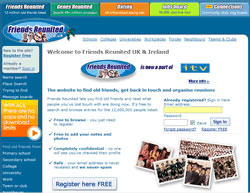 Friends Reunited and ITV have decided to make it legal; after a short romance, a deal’s been agreed. Rumours they’d been seeing other suitors that included BT, News Corp and that bastion of middle England the Daily Mail & General Trust, did little to cool the ardour of an excited ITV.
Friends Reunited and ITV have decided to make it legal; after a short romance, a deal’s been agreed. Rumours they’d been seeing other suitors that included BT, News Corp and that bastion of middle England the Daily Mail & General Trust, did little to cool the ardour of an excited ITV. “When ITV approached us we immediately clicked; they share our values, they’re a national institution that is trusted and well loved, and by joining with them, Friends Reunited will become the UK ‘s 8th most visited site giving us access to a vast audience so we can connect even more of you even more of the time.”
“When ITV approached us we immediately clicked; they share our values, they’re a national institution that is trusted and well loved, and by joining with them, Friends Reunited will become the UK ‘s 8th most visited site giving us access to a vast audience so we can connect even more of you even more of the time.” “A powerful consolidated online advertising sales proposition. 53% of Friends Reunited users are in the ABC1 demographic and 40% are in the 16-34 age range – both key audiences for advertisers. It will contribute additional advertising synergies as ITV Internet sales will have increased scale, becoming a one-stop-shop for media agencies in the online space.”
“A powerful consolidated online advertising sales proposition. 53% of Friends Reunited users are in the ABC1 demographic and 40% are in the 16-34 age range – both key audiences for advertisers. It will contribute additional advertising synergies as ITV Internet sales will have increased scale, becoming a one-stop-shop for media agencies in the online space.” TiVo has announced that it plans to offer the first TV-based advertising “search solution” early next year.
TiVo has announced that it plans to offer the first TV-based advertising “search solution” early next year. With punters able to search for products by category or associated keywords, TiVo sees big benefits for advertisers (obviously) and punters looking for information on products or services.
With punters able to search for products by category or associated keywords, TiVo sees big benefits for advertisers (obviously) and punters looking for information on products or services. Supping deeply on a morning brew of Buzzword Coffee, Tracey Scheppach, VP, Video Innovations Director at Starcom, enthused “The new TiVo application will provide both a needed platform for consumers to seek out relevant, searchable commercial content and an environment for advertisers to engage highly desirable and motivated consumers…it’s the first of its kind in the industry, and a platform that is clearly needed in this challenging advertising marketplace.”
Supping deeply on a morning brew of Buzzword Coffee, Tracey Scheppach, VP, Video Innovations Director at Starcom, enthused “The new TiVo application will provide both a needed platform for consumers to seek out relevant, searchable commercial content and an environment for advertisers to engage highly desirable and motivated consumers…it’s the first of its kind in the industry, and a platform that is clearly needed in this challenging advertising marketplace.” The Internet was supposed to herald in an age of paperless offices, online browsing and tree-untroubling electronic mail, but it seems that when it comes to flogging goods, the trusty old print catalogue still rules the roost.
The Internet was supposed to herald in an age of paperless offices, online browsing and tree-untroubling electronic mail, but it seems that when it comes to flogging goods, the trusty old print catalogue still rules the roost. The survey found that old fashioned catalogues remain one of the most effective promotional channels for generating online orders, with 60% of survey respondents currently licking stamps on catalogues and brochures to be sent to customers in an attempt to increase online sales.
The survey found that old fashioned catalogues remain one of the most effective promotional channels for generating online orders, with 60% of survey respondents currently licking stamps on catalogues and brochures to be sent to customers in an attempt to increase online sales. Additionally, the survey revealed that 55% of retailers planned to follow the annoying trend set by High Street stores and “extend” the Christmas buying period by encouraging consumers to buy earlier (If only we could “extend” the Christmas holiday period too).
Additionally, the survey revealed that 55% of retailers planned to follow the annoying trend set by High Street stores and “extend” the Christmas buying period by encouraging consumers to buy earlier (If only we could “extend” the Christmas holiday period too). Around 80% of consumers are expected to buy at least a quarter of their Christmas purchases online this year – up a mighty 15% over last year.
Around 80% of consumers are expected to buy at least a quarter of their Christmas purchases online this year – up a mighty 15% over last year. Nielsen, the top American agency that measures TV viewing audiences, is going to provide ratings that take account of time-shifted viewing through digital recording devices like TiVos even though viewers are able to, and in my experience, generally do, fast-forward through the paid for messages.
Nielsen, the top American agency that measures TV viewing audiences, is going to provide ratings that take account of time-shifted viewing through digital recording devices like TiVos even though viewers are able to, and in my experience, generally do, fast-forward through the paid for messages.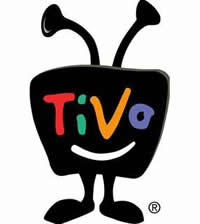 The US networks say that time-shifted ratings should be taken into account, and point out that PVR users watch more TV – which we don’t dispute. They watch around 5.7 hours and that’s more than 10% extra when compared with the technologically-disadvantaged standard household. Their logic follows that this extra 10% of viewing, gives them more opportunity to see commercials. With PVR penetration in the USA already around 8% of the TV universe and expected to rise steadily over the coming years, this adds up to a is significant amount for media buyers.
The US networks say that time-shifted ratings should be taken into account, and point out that PVR users watch more TV – which we don’t dispute. They watch around 5.7 hours and that’s more than 10% extra when compared with the technologically-disadvantaged standard household. Their logic follows that this extra 10% of viewing, gives them more opportunity to see commercials. With PVR penetration in the USA already around 8% of the TV universe and expected to rise steadily over the coming years, this adds up to a is significant amount for media buyers. The commercial rivalry between two UK online retailers has spilt over into the world of advertising, or more precisely the heady world of UK advertising adjudication, run by the Advertising Standards Authority.
The commercial rivalry between two UK online retailers has spilt over into the world of advertising, or more precisely the heady world of UK advertising adjudication, run by the Advertising Standards Authority.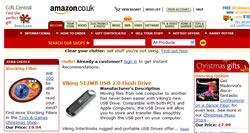 The ASA batted the first complaint aside, but felt the second held water despite Tesco putting up the follow argument. Their long winded thinking can be cut down to … As no single CD or DVD was priced over £19 (thank goodness – our addition), to qualify for the Amazon free delivery, it entailed ordering more than one item.
The ASA batted the first complaint aside, but felt the second held water despite Tesco putting up the follow argument. Their long winded thinking can be cut down to … As no single CD or DVD was priced over £19 (thank goodness – our addition), to qualify for the Amazon free delivery, it entailed ordering more than one item.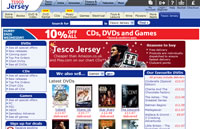 But this jiggery pokery didn’t get them off the hook and the ASA found against them.
But this jiggery pokery didn’t get them off the hook and the ASA found against them. Partially arguing against the UK ban on advertising by organisations that attempt to “influence public opinion on a matter of controversy”, she says her group will challenge the ban. Allen is right in some respects when she says:
Partially arguing against the UK ban on advertising by organisations that attempt to “influence public opinion on a matter of controversy”, she says her group will challenge the ban. Allen is right in some respects when she says: Nestled down low in the small print of an advert for some HP servers which run unix/Windows and Linux, the following text can be found
Nestled down low in the small print of an advert for some HP servers which run unix/Windows and Linux, the following text can be found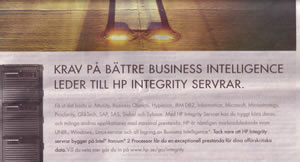 Quite who originally spotted this blunder in the small print, isn’t known, but we suspect that it’s someone with a very keen eye for detail – verging on the fanatical.
Quite who originally spotted this blunder in the small print, isn’t known, but we suspect that it’s someone with a very keen eye for detail – verging on the fanatical. An Australian production company has made what they are claiming is the first music video shot entirely with mobile-phone cameras.
An Australian production company has made what they are claiming is the first music video shot entirely with mobile-phone cameras.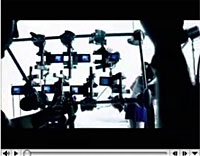 A multiplicity of mobiles (which look like Sony Ericsson k750i’s to us) were set up on frames and tripods with handheld footage recorded by four crew members who wandered around the band as they played, with the footage being sent via Bluetooth to laptops.
A multiplicity of mobiles (which look like Sony Ericsson k750i’s to us) were set up on frames and tripods with handheld footage recorded by four crew members who wandered around the band as they played, with the footage being sent via Bluetooth to laptops. The director of music video, Grant Marshall from Film Headquarters tries to explain, ‘We came up with this idea 18 months ago but couldn’t find a band that would embrace the risk and vision. P.U.S.A loved the concept and were brave enough to undertake the risk. This was a fantastic experience for all of us. The band was fabulous and incredibly professional.”
The director of music video, Grant Marshall from Film Headquarters tries to explain, ‘We came up with this idea 18 months ago but couldn’t find a band that would embrace the risk and vision. P.U.S.A loved the concept and were brave enough to undertake the risk. This was a fantastic experience for all of us. The band was fabulous and incredibly professional.” After an encouraging response from listeners, Virgin Radio has announced that it will be making its Sunday afternoon programme ‘The Tim Lovejoy Show’ available as a podcast.
After an encouraging response from listeners, Virgin Radio has announced that it will be making its Sunday afternoon programme ‘The Tim Lovejoy Show’ available as a podcast. Lovejoy’s sports and entertainment show is broadcast weekly from 4pm to 7pm, and Virgin have said that they’ll make the “best bits” available for consumers to download to their MP3 players from 28th August.
Lovejoy’s sports and entertainment show is broadcast weekly from 4pm to 7pm, and Virgin have said that they’ll make the “best bits” available for consumers to download to their MP3 players from 28th August.